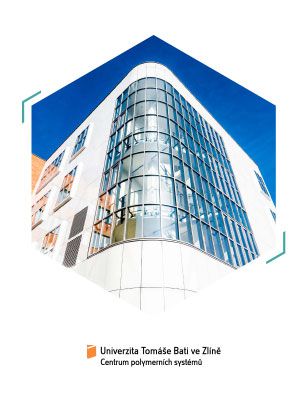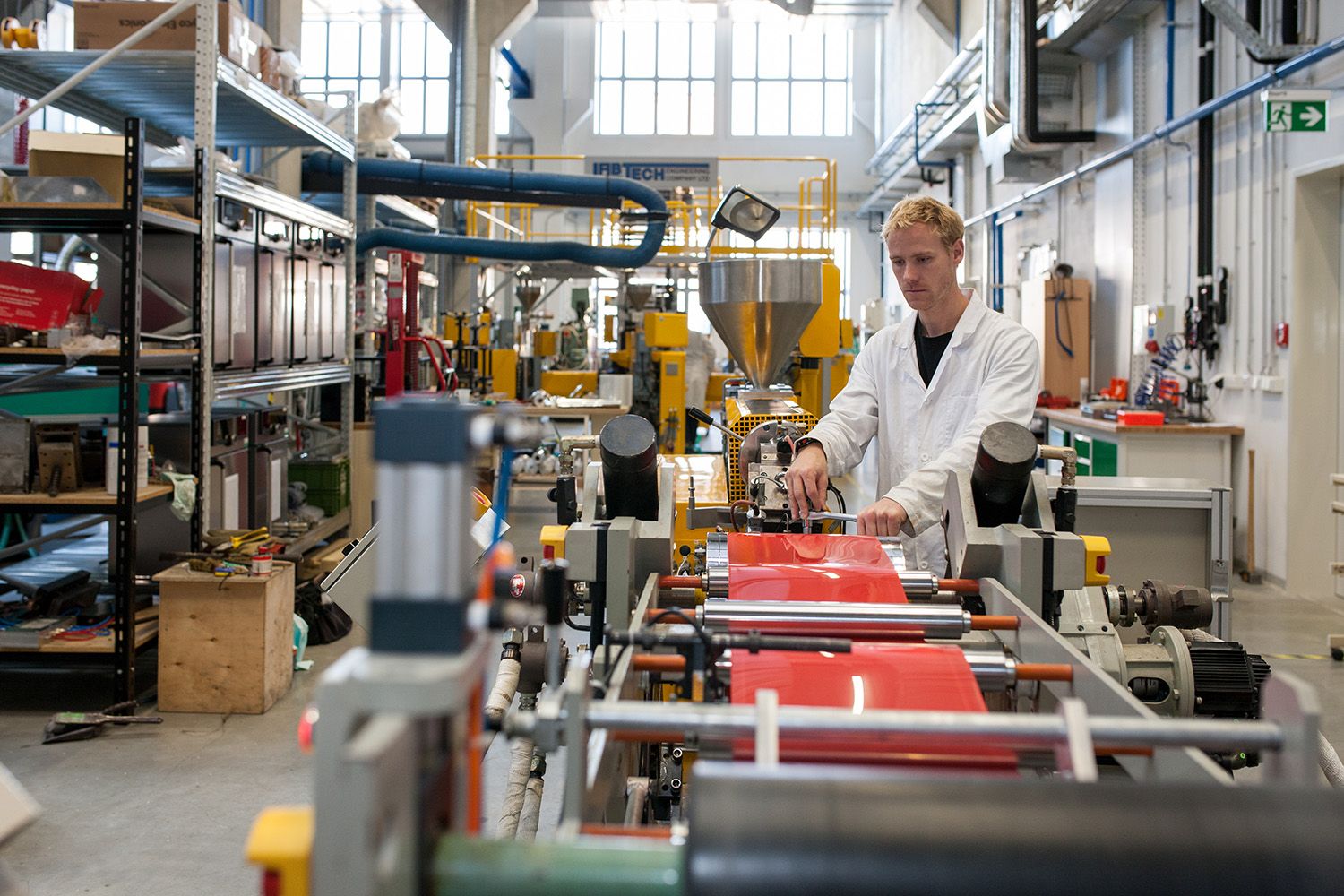Polymer processing
Development of research direction
RP/CPS/2024-28/003 - Sustainable applications of advanced polymer systems, 2024-2028
Principal Researcher: Ing. Tomáš Plachý, Ph.D.
The aim of the project is the modification and processing of polymer systems with regard to ensuring the required resulting material and useful properties when using advanced processing technologies. The objective effort will be to replace classic synthetic polymers with sustainable raw materials and materials obtained from recycling processes (e.g. waste materials and intermediate products) or renewable sources (e.g. PLA, PBAT, PBS, natural particle systems).
Implemented projects
CZ.01.01.01/01/24_063/0006835 Second generation XPP foam for sandwich panel applications,2026 - 2028
FW12010276 - Modification of surface properties using micro- and nanostructures for industrial applications, 2025-2027
TQ15000300 - Flexible side emitting lightguides, 2025-2026
GA25-16538S - Unconventional piezoactive particles for highly efficient mechano ATRP method, 2025-2027
FW06010324 Project Trend - Reduction of the carbon footprint of non-woven fabric especially for disposable hygienic and medical applications (cooperation with PFNonwovens Czech s.r.o.) - 2023-2026
Completed projects
NPRP13S-0127-200177GreenHouses for Qatari Climate: Energy Saving Smart and Sustainable Phase Change Materials (Green3SPCM), 2022-2024
TK05020036 Project Théta 5 - "Halogen-free safety electrical cables meeting the requirements of LOCA of the latest types of nuclear power plants and the latest requirements for fire safety according to European and national legislation (CPR EU/305/2011, EN 50575, CSN 73 0895); cooperation with PRAKAB PRAŽSKÁ KABELOVNA s.r.o.)" - 2023-2025
FW03010465 Project Trend - Technological production scrap as an innovative material source in a process of production of nonwoven textile (coopeartion with PEGAS NONWOVENS a PFN-FIC) - 2021-2025
GA22-33307S Development of novel 3D hierarchically structured polysaccharides and proteins porous systems - 2022-2024
TE01020216 - The project of Competence centre “Centre of advanced polymer and composite materials” in consortium of Tomas Bata University and 5 companies, 2012 – 2019
FV20088 - “Development of novel formulations for modification of asphalt mixtures using recycled polyvinylbutyral”, 2017 – 2019
Research outcomes

Atom transfer radical polymerization of 2-isopropenyl-2-oxazoline in solution and from the surface of carbonyl iron particles toward fabrication of a cytocompatible magneto-responsive hybrid filler
Synthesis and exfoliation of calcium organophosphonates for tailoring rheological properties of sodium alginate solutions: A path toward polysaccharide-based bioink

Injection-molded isotactic polypropylene colored with green transparent and opaque pigments

Engineering conductivity and performance in electrorheological fluids using a nanosilica grafting approach

Viscoelastic response of elastohydrodynamically lubricated compliant contacts below glass-transition temperature
Influence of PMMA brushes grafted from GO on rheological properties of PMMA/SAN immiscible blend in shear and elongation flow

Three-dimensional printing process for musical instruments: Sound reflection properties of polymeric materials for enhanced acoustical performance
Phase change materials designed from Tetra Pak waste and paraffin wax as unique thermal energy storage systems

Effect of chain extending cross-linkers on the disintegration behavior of composted PBAT/PLA blown films

Modification of polyvinyl chloride composites for radiographic detection of polyvinyl chloride retained surgical items

Interactions between sodium hyaluronate and β-cyclodextrin as seen by transport properties

Semi-conducting microspheres formed from glucose for semi-active electric field-responsive electrorheological systems
Contacts
Head of the group: prof. Ing. Tomáš Sedláček, Ph.D.
Scientific team
Ph.D. students
-
prof. Ing. Tomáš Sedláček, Ph.D.
-
+420 57 603 8012
-
+420 724 434 581
-
A416
-
This email address is being protected from spambots. You need JavaScript enabled to view it. -
research
-
prof. Mgr. Aleš Mráček, Ph.D.
-
+420 57 603 1730
-
A218
-
This email address is being protected from spambots. You need JavaScript enabled to view it. -
research
-
doc. Ing. Antonín Minařík, Ph.D.
-
+420 57 603 5166
-
A316
-
This email address is being protected from spambots. You need JavaScript enabled to view it. -
research
-
doc. Ing. Martina Polášková, Ph.D.
-
+420 57 603 1727
-
A214
-
This email address is being protected from spambots. You need JavaScript enabled to view it.
-
doc. Ing. Petr Smolka, Ph.D.
-
+420 57 603 5166
-
A316
-
This email address is being protected from spambots. You need JavaScript enabled to view it. -
research
-
Ing. Markéta Ilčíková, Ph.D.
-
+420 57 603 1728
-
A216
-
This email address is being protected from spambots. You need JavaScript enabled to view it. -
research
-
Ing. Přemysl Fajkus
-
+420 57 603 1721
-
A207
-
This email address is being protected from spambots. You need JavaScript enabled to view it.
-
Ing. Danila Gorgol
-
+420 57 603 1721
-
A207
-
This email address is being protected from spambots. You need JavaScript enabled to view it.
- Ing. Markéta Kadlečková, Ph.D.
-
+420 57 603 1727
-
A214
-
This email address is being protected from spambots. You need JavaScript enabled to view it.
-
Ing. Karolína Kocourková, Ph.D.
-
+420 57 603 5108
-
433/U15
-
This email address is being protected from spambots. You need JavaScript enabled to view it.
- Ing. Roman Kolařík, Ph.D.
-
+420 57 603 8028
-
A215
-
This email address is being protected from spambots. You need JavaScript enabled to view it. -
research
- Ing. Lukáš Maňas, Ph.D.
-
+420 57 603 1737
-
A228
-
This email address is being protected from spambots. You need JavaScript enabled to view it. -
research
- Ing. Miroslav Mrlík, Ph.D.
-
+420 57 603 8027
-
A314
-
This email address is being protected from spambots. You need JavaScript enabled to view it. -
research
- Ing. Josef Osička, Ph.D.
-
+420 57 603 1728
-
A216
-
This email address is being protected from spambots. You need JavaScript enabled to view it. -
research
-
Ing. Erika Pavlíková, Ph.D.
-
+420 57 603 1730
-
A218
-
This email address is being protected from spambots. You need JavaScript enabled to view it.
- Ing. Tomáš Plachý, Ph.D.
-
+420 57 603 1730
-
A218
-
This email address is being protected from spambots. You need JavaScript enabled to view it. -
research
- Ing. Daniel Sanétrník, Ph.D.
-
+420 57 603 1736
-
A226
-
This email address is being protected from spambots. You need JavaScript enabled to view it. -
research


